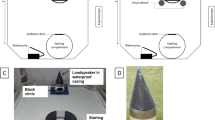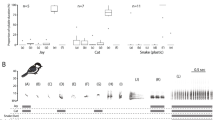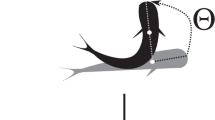Abstract
Predation is a major force in shaping the behaviour of animals1,2,3, so that precise identification of predators will confer substantial selective advantages on animals that serve as food to others. Because experience with a predator can be lethal, early researchers studying birds suggested that predator recognition does not require learning4,5. However, a predator image that can be modified by learning and experience will be advantageous in situations where cues associated with the predator are highly variable or change over time. In this study, we investigated the response of harbour seals (Phoca vitulina) to the underwater calls of different populations of killer whales (Orcinus orca). We found that the seals responded strongly to the calls of mammal-eating killer whales and unfamiliar fish-eating killer whales but not to the familiar calls of the local fish-eating population. This demonstrates that wild harbour seals are capable of complex acoustic discrimination and that they modify their predator image by selectively habituating to the calls of harmless killer whales. Fear in these animals is therefore focused on local threats by learning and experience.
This is a preview of subscription content, access via your institution
Access options
Subscribe to this journal
Receive 51 print issues and online access
$199.00 per year
only $3.90 per issue
Buy this article
- Purchase on Springer Link
- Instant access to full article PDF
Prices may be subject to local taxes which are calculated during checkout


Similar content being viewed by others
References
Tuttle, M. D. & Ryan, M. J. Bat predation and the evolution of frog vocalizations in the neotropics. Science 214, 677–678 (1981)
Gliwicz, M. Z. Predation and the evolution of vertical migration in zooplankton. Nature 320, 746–748 (1986)
Rattenborg, N. C., Lima, S. L. & Amlaner, C. J. Half-awake to the risk of predation. Nature 397, 397–398 (1999)
Lorenz, K. Vergleichende Verhaltensforschung. Verhand. Deutsch. zool. Gesselschaft 1939, 69–102 (1939)
Tinbergen, N. Social releasers and the experimental method required for their study. Wilson Bull. 60, 6–51 (1948)
Ford, J. K. B. et al. Dietary specialization in two sympatric populations of killer whales (Orcinus orca) in coastal British Columbia and adjacent waters. Can. J. Zool. 76, 1456–1471 (1998)
Saulitis, E., Matkin, C., Barrett-Lennard, L., Heise, K. & Ellis, G. Foraging strategies of sympatric killer whale (Orcinus orca) populations in Prince William Sound. Mar. Mamm. Sci. 16, 94–109 (2000)
Bigg, M. A., Olesiuk, P. F., Ellis, G. M., Ford, J. K. B. & Balcomb, K. C. Social organization and genealogy of resident killer whales (Orcinus orca) in the coastal waters of British Columbia and Washington State. Rep. Int. Whal. Commission (spec. issue) 12, 383–405 (1990)
Hoelzel, R. A. & Dover, G. A. Genetic differentiation between sympatric killer whale populations. Heredity 66, 191–196 (1991)
Hoelzel, A. R., Dahlheim, M. & Stern, S. J. Low genetic variation among killer whales (Orcinus orca) in the eastern North Pacific and genetic differentiation between foraging specialists. J. Hered. 89, 121–128 (1998)
Barrett-Lennard, L. G. Population Structure and Mating Patterns of Killer Whale Populations in the Northeastern Pacific, as Revealed by DNA Analysis. PhD thesis, Univ. British Columbia (2000).
Ford, J. K. B. Acoustic behaviour of resident killer whales (Orcinus orca) off Vancouver Island, British Columbia. Can. J. Zool. 67, 727–745 (1989)
Barrett-Lennard, L. G., Ford, J. K. B. & Heise, K. A. The mixed blessing of echolocation: Differences in sonar use by fish-eating and mammal-eating killer whales. Anim. Behav. 51, 553–565 (1996)
Ford, J. K. B. Vocal traditions among resident killer whales (Orcinus orca) in coastal waters of British Columbia, Canada. Can. J. Zool. 69, 1454–1483 (1991)
Yurk, H., Barrett-Lennard, L., Ford, J. K. B. & Matkin, C. O. Cultural transmission within maternal lineages: Vocal clans in resident killer whales in Southern Alaska. Anim. Behav. 63, 1103–1119 (2002)
Deecke, V. B., Ford, J. K. B. & Spong, P. Dialect change in resident killer whales (Orcinus orca): Implications for vocal learning and cultural transmission. Anim. Behav. 60, 619–638 (2000)
Møhl, B. Auditory sensitivity of the common seal in air and water. J. Aud. Res. 8, 27–38 (1968)
Miller, P. J. O. Maintaining Contact: Design and Use of Acoustic Signals in Killer Whales, Orcinus orca. PhD thesis, Joint Program in Oceanography/Applied Ocean Science and Engineering, Woods Hole Oceanographic Institution and Massachusetts Institute of Technology (2000).
Nichol, L. M. & Shackleton, D. M. Seasonal movements and foraging behaviour of northern resident killer whales (Orcinus orca) in relation to the inshore distribution of salmon (Oncorhynchus ssp.) in British Columbia. Can. J. Zool. 74, 983–991 (1996)
Schleidt, W. M. Über die Auslösung der Flucht vor Raubvögeln bei Truthühnern. Naturwissenschaften 5, 141–142 (1961)
Wiley, R. H. in Behavioral Mechanisms in Evolutionary Ecology (ed. Real, L. A.) 157–189 (Univ. Chicago Press, Chicago, IL, 1994)
Bradbury, J. W. & Vehrencamp, S. L. Principles of Animal Communication (Sinauer, Sunderland, MA, 1998)
Curio, E. Proximate and developmental aspects of antipredator behavior. Adv. Study Behav. 22, 135–238 (1993)
Kroodsma, D. E. Suggested experimental design for song playbacks. Anim. Behav. 37, 600–609 (1989)
Zar, J. C. Biostatistical Analysis (Prentice Hall, Upper Saddle River, NJ, 1996)
Acknowledgements
We thank the Vancouver Aquarium Marine Science Centre, the BC Killer Whale Adoption Program, the German Academic Exchange Service. We also thank P. Arcese, L. Barrett-Lennard, C. Brignall, J. Borrowman, M. Borrowman, J. deBoeck, N. Dedeluk, G. Ellis, C. Emmons, M. Enstipp, V. Janik, B. Mackay, D. Mackay, A. Morton, R. North, P.-A. Presi, A. Spong, S. Taylor, F. Ugarte, J. Watson, G. Weingartner, R. Williams and H. Yurk.
Author information
Authors and Affiliations
Corresponding author
Ethics declarations
Competing interests
The authors declare that they have no competing financial interests.
Rights and permissions
About this article
Cite this article
Deecke, V., Slater, P. & Ford, J. Selective habituation shapes acoustic predator recognition in harbour seals. Nature 420, 171–173 (2002). https://doi.org/10.1038/nature01030
Received:
Accepted:
Issue Date:
DOI: https://doi.org/10.1038/nature01030
This article is cited by
-
Context of breaching and tail slapping in Indo-Pacific humpback dolphins in the northern South China Sea
Behavioral Ecology and Sociobiology (2023)
-
Occurrence of long-finned pilot whales (Globicephala melas) and killer whales (Orcinus orca) in Icelandic coastal waters and their interspecific interactions
acta ethologica (2022)
-
Friend or foe: Risso’s dolphins eavesdrop on conspecific sounds to induce or avoid intra-specific interaction
Animal Cognition (2022)
-
Equivalence classification, learning by exclusion, and long-term memory in pinnipeds: cognitive mechanisms demonstrated through research with subjects under human care and in the field
Animal Cognition (2022)
-
Passive acoustic monitoring of killer whales (Orcinus orca) reveals year-round distribution and residency patterns in the Gulf of Alaska
Scientific Reports (2021)
Comments
By submitting a comment you agree to abide by our Terms and Community Guidelines. If you find something abusive or that does not comply with our terms or guidelines please flag it as inappropriate.



